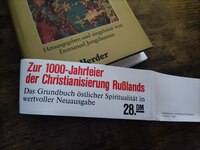
>>9215
Interesting, I didn't know Flaubert wrote anything in the general direction of religious philosophy. This will be an interesting read.
>It's also my first Flaubert and his vivid descriptions of the Ancient world already gave me a good impression of his prosaic skill.
Oh yeah, he's amazing with this. I absolutely fell in love with Salammbo upon reading it, I wish there were more books written in this enchanting style. It almost felt like I'm a little child again, falling asleep to my grandmother reading me fairy tales.
>Very nice. I also think the actual pilgrimage and the pilgrim's stories, the characters he meets etc. are the highlight of this book.
It also came with this strip, and the pricing is still in marks, lol.
I think I get what you've meant by saying that it feels as if Tolstoy wrote it, because Tolstoy was able to reproduce with great skill this very open, almost naive, inornate and down to earth type of speech and life among the Orthodox peasantry. It especially reminded me of his short story "How Much Land Does a Man Need?"
Speaking of Tolstoy, I definitely recommend his novella "The Death of Ivan Ilyich". It's principle Russian literature and a superlative work on spirituality. Tolstoy is unparalleled in creating a thousand-page long windows into a wholeheartedly living worlds, but what he achieves in this one with just a hundred pages is just astonishing. It's an absolutely unforgettable masterpiece.